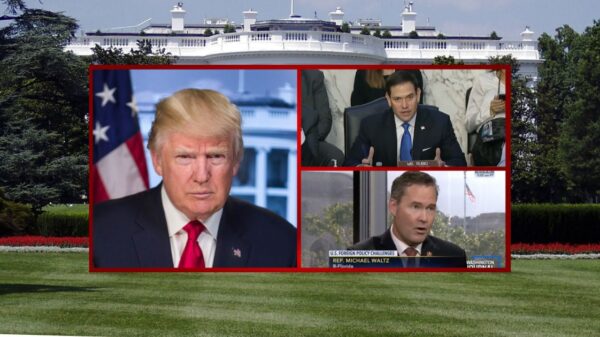Freshman U.S. Rep. Mike Waltz, R-Fla., the first Green Beret to ever serve in Congress and who served in Afghanistan, is backing U.S. Rep. Jim Banks’, R-Ind., “Ensuring a Secure Afghanistan Act,” a proposal “which specifies a list of requirements that must be met before U.S. troop levels can fall below 10,000 in Afghanistan.”
This week, Waltz joined Banks, U.S. Rep. Liz Cheney, R-Wy., and U.S. Rep. Elise Stefanik, R-NY, in pushing the proposal. Waltz served as an aide to Cheney’s father former Vice President Dick Cheney focused on counterterrorism. All four of the Republicans serve on the U.S. House Armed Services Committee.
“I’ve fought in Afghanistan and know the destabilizing threat the Taliban continues to pose there,” Waltz said on Wednesday. “With our Afghan allies not yet prepared to defend themselves and over half of the world’s terrorist organizations currently residing on the Pakistan-Afghanistan border, the stakes are simply too high to take the Taliban at their word. We must stay on offense and negotiate from a position of strength. While we all hope for peace in Afghanistan, any deal must include denouncing Al Qaeda and terrorism, assuring girls’ access to education and healthcare, and recognizing the legitimacy of the Afghan Constitution. The Ensuring a Secure Afghanistan Act provides necessary oversight over the current negotiations and sets benchmarks for any major U.S. reductions of military force.”
“Every American longs for the day when U.S. troops will return home from Afghanistan after a nearly two decade struggle against those responsible for the 9/11 terrorist attacks,” said Banks. “However, we cannot afford to be overly eager to strike any deal, especially a bad one, that looks to satisfy short term political pressures at the risk of long-term national security threats. The failed blunders of history, especially President Obama’s disastrous Iraq withdrawal, have demonstrated the grave risks posed by power vacuums in unstable regions of the world that were caused by a premature retreat. As the Administration negotiates with our adversaries to set the terms for a drawdown of U.S. forces in Afghanistan, the Ensuring a Secure Afghanistan Act would set the conditions by which a safe and responsible agreement should be reached. Should America not get this right the first time, ISIS-K and al Qaeda patiently wait to fill the void.”
“The American homeland is endangered when Afghanistan is used as a safe haven for terrorism,” Cheney said. “We saw the consequences of prematurely withdrawing troops from Iraq under President Obama and we cannot make that mistake in Afghanistan. We don’t win wars by leaving. That is why I’m proud to be a lead co-sponsor on the Ensuring a Secure Afghanistan Act. The Islamic State is conducting active operations in Afghanistan and is estimated to have thousands of militants there. Meanwhile, al Qaeda has maintained its strong relationship with the Taliban. Afghan forces continue to sustain great casualties in their struggle against the Taliban, even with U.S. assistance. Considering the conditions on the ground, U.S. troops must continue the fight against terrorism in Afghanistan in support of their ultimate mission: keeping America safe.”
“While our military has fought valiantly and made great gains against terrorist networks such as ISIS and al Qaeda, our work to combat terrorism is not over,” said Stefanik. “Unfortunately, the consequences of President Obama’s premature withdrawal from Iraq were far too significant for us to risk making the same mistake in Afghanistan. Current conditions suggest that a withdrawal at this time would not only be misguided but also counterproductive in our fight against terrorism and our overall national defense strategy. I am proud to cosponsor the Ensuring a Secure Afghanistan Act, which would keep our U.S. strategy consistent, allow U.S. troops to continue their fight against terrorism, and set conditions that must be met to ensure that future plans of withdrawal are executed successfully.”
The proposal “endeavors to prevent a significant U.S. troop drawdown from Afghanistan in case of a bad deal between the United States and the Taliban, a group that has long maintained ties with al Qaeda.”
“It is paramount that prior to withdrawing its forces, the United States ensures that the Afghan government is capable of securing its borders, maintaining its own military forces, and preventing the establishment of terrorist safe havens. If the Taliban does not comply with the standards outlined in this bill, the United States will not be able to withdraw a significant number of troops using FY2019 funding,” Waltz’s office noted. “The U.S. must be cautious about the possibility of striking a bad deal to satisfy short term political gains, jeopardizing long-term stability in the region. In the event of a rapid U.S. withdrawal and power vacuum, terrorist groups like ISIS-K would fill the void left behind by U.S. forces and pose a greater threat to the homeland. Should a premature withdrawal of the United States Armed Forces from Afghanistan occur, it would result in instability, violence, and the loss of human rights that have been established through the presence of the United States and our allies. As a result, the security of the United States, Afghanistan, the Middle East, and Central and South Asia would be threatened.”
Before reducing the American military presence in Afghanistan below 10,000 troops, the bill would have the Director of National Intelligence ensure the Taliban “does not associate with al Qaeda, to include fighting alongside the group, having financial ties to it, or any other affiliation; supports the legitimacy of the Afghan Constitution; commits to protecting the rights of women and girls to access public healthcare, hold property, access education, and have freedom of movement; eliminates incoming foreign funds and military support from non-Afghan governments or organizations; and assists and actively partners with the governments of the United States and Afghanistan in future counterterrorism operations, including incriminating members of the Taliban that violate any of these provisions to the government of Afghanistan.”
“We find the Afghan government’s exclusion from the ongoing peace talks troubling. Also troubling is the Taliban’s continued relationship with al Qaeda. This bill makes clear: The American homeland is more secure when Afghanistan is stable and safe,” Waltz’s office insisted.
The bill was sent to the U.S. House Armed Services and Foreign Affairs Committee. So far, there is no companion bill over in the U.S. Senate.
During his first three months in Congress, Waltz has often focused on Afghanistan, taking to the national airwaves to warn that pulling out of that country will lead to more terrorist attacks.
A graduate of VMI, Waltz served in the Army Special Forces in Afghanistan and is now the first Green Beret ever elected to Congress. He worked in George W. Bush’s administration, including as an advisor to Vice President Dick Cheney. Since then, Waltz has made the rounds on cable TV including as a Fox News contributor but he has also made appearances on CNN, MSNBC, PBS and other channels. In November, Waltz won an open congressional seat representing parts of Northeast and Central Florida, replacing Republican Ron DeSantis who was elected governor.
Kevin Derby can be reached at Kevin.Derby@floridadaily.com.




















